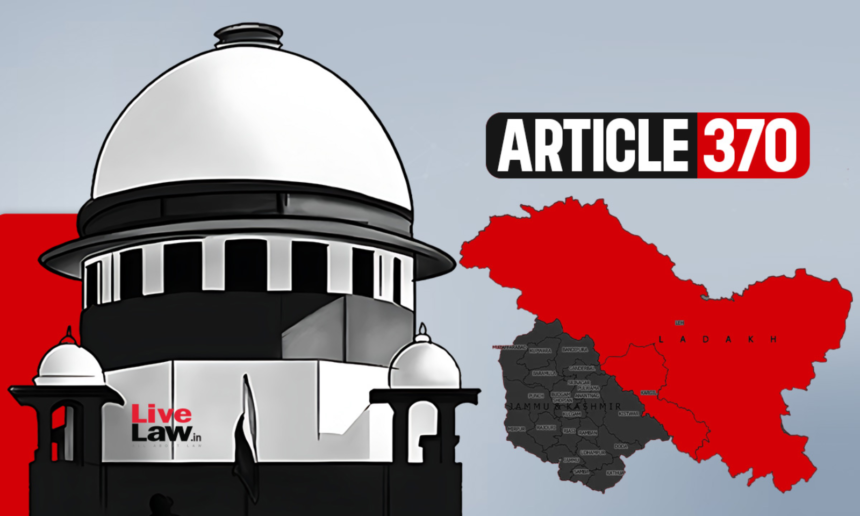SC Upholds Repeal of Kashmir Special Status – India’s Supreme Court handed down a monumental judgment on Monday regarding the constitutionally complex and politically contentious issue of Kashmiri autonomy. The court ruled that the Hindu nationalist government’s 2019 move to revoke the Muslim-majority region’s special status was legal. Here’s an in-depth look at the judgment and what it means.
Why SC Upholds Repeal of Kashmir Special Status?

Article 370 of India’s constitution granted the state of Jammu and Kashmir a significant degree of autonomy and self-governance. The article limited Parliament’s legislative powers in the region.
This special status dated back to Kashmir’s accession to India in 1947. The region was permitted to draft its own constitution and control over all affairs barring defense, communications, and foreign affairs.
In August 2019, Prime Minister Narendra Modi’s government annulled Article 370, splitting Jammu and Kashmir into two federal territories governed by New Delhi. The government argued this move would foster Kashmir’s development and integration.
But it was extremely controversial given Kashmiris were not consulted and it overturned longstanding constitutional commitments granting the region autonomy. It prompted a major crackdown, mass arrests and lengthy internet shutdown.
Supreme Court Judgment & Rationale
In a unanimous verdict by a five-judge bench, India’s Supreme Court ruled the government’s actions were legal.
Key aspects of the judgment included:
- Jammu and Kashmir “absolutely and completely” surrendered its sovereignty to the Indian union when acceding in 1947. Hence New Delhi could unilaterally change its status.
- Article 370 was never intended to guarantee permanent special status or preclude its repeal.
- The president had the power to issue an order annulling Article 370 without state assembly approval.
- Bifurcating Jammu and Kashmir into federal territories was constitutionally valid.
The Supreme Court judgment endorsed the centre’s arguments that Article 370 was only intended as a temporary provision allowing a transition to full integration as SC Upholds Repeal of Kashmir Special Status.
The court held that after Kashmir acceded to India, sovereignty entirely vested with the republic. Therefore, New Delhi could amend Kashmir’s status through regular parliamentary procedure.
Implications of the Verdict

Politically, the judgment is a major boost for Modi’s BJP government. The court validated its core ideological stance that Kashmir must be fully assimilated into India.
But the verdict deals a significant blow to Kashmiri regional parties who have long advocated autonomy. Many Kashmiris will see this as further denial of self-determination.
Legally, this cements extensive central government control over Kashmir. It sets a precedent enhancing New Delhi’s powers over states and union territories nationwide.
The court ordered fresh state elections be held by 2024. But restoring Kashmiri democracy remains challenging given the crackdowns and detention of political leaders.
For civil liberties, the judgment bodes poorly. Despite international censure of India’s heavy-handed tactics, the court showed deference to government-imposed restrictions.
Geopolitically, the verdict could inflame tensions with Pakistan, which claims Kashmir. But it shreds arguments that India’s actions violated UN resolutions or Kashmiris’ right to self-determination.
Ultimately, rather than resolving the complex Kashmir dispute, many see this ruling as likely extending conflict by validating India’s forceful integration attempts over Kashmiri wishes.
Domestic Reactions to the Verdict
India’s political sphere reacted along predictable lines to the monumental judgment:

Ruling BJP
- Hailed judgment as “historic” vindicating their stand as SC Upholds Repeal of Kashmir Special Status
- Said it will integrate Kashmir, foster development and peace
Kashmiri regional parties
- Slammed verdict as betrayal of trust and aspirations
- Warned it will increase Kashmiri alienation
Congress & left parties
- Termed judgment one-sided attempt to suppress dissent as SC Upholds Repeal of Kashmir Special Status
- Cautioned against celebrating when people jailed
Legal experts
- Divided on implications for federalism and constitutionalism
- Some praised extensive interpretation, others called it overreach
International Reaction
Globally, reactions reflected stances on Kashmir and ties with India:

Pakistan
- Sharply critical, rejecting India’s “forcible” control
- Accused court of endorsing illegal actions
China
- Urged peaceful resolution respecting Kashmiri wishes
- Emphasized issues left by UN are disputed bilaterally
United Nations
- Stressed Charter commitment to self-determination
- Encouraged all sides to resolve peacefully
United States
- Deferred to India as strategic partner, termed issue bilateral
- Advocated return of rights and governance
Gulf States
- Largely silent given importance of India ties
- Pakistan lobbied Islamic group for condemnation
In summary, while major external powers avoided overt criticism, few endorsed India’s integrationist approach. But none can meaningfully pressure New Delhi as influential strategic partner.
Conclusion
The Supreme Court verdict legally reinforces Hindu nationalist efforts toward fully assimilating Kashmir into the Indian union. Politically, it vindicates the Modi government’s drastic move to annul constitutional autonomy commitments.
But rather than resolving this complex, bloody dispute, many see the judgment as SC Upholds Repeal of Kashmir Special Status as extending conflict by denying Kashmiri self-determination. For better or worse, the court decisively closed the legal debate in India over Kashmir’s status. Yet politically and morally, that debate remains very much open globally.
Tell us in the comments what your view is on the Supreme Court upholding the repeal of Kashmir’s special status. Do you think this will help resolve the situation or make things worse? Should Kashmiris have been consulted? Why or why not? Weigh in below!









